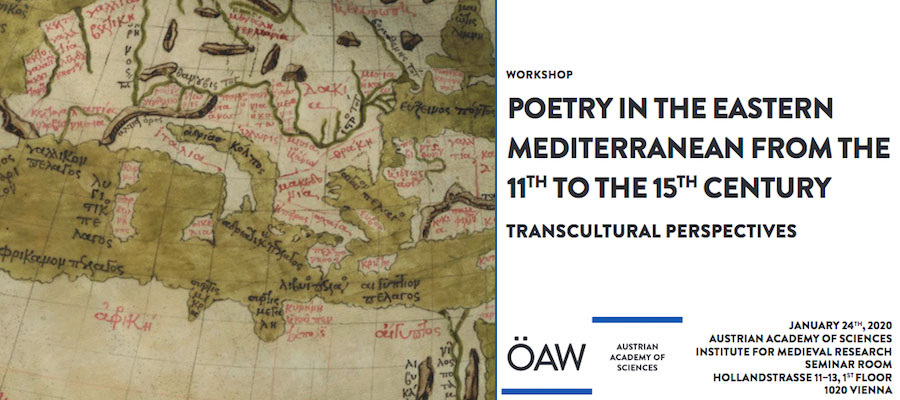Poetry in the Eastern Mediterranean from the 11th to the 15th Century: Transcultural Perspectives, Austrian Academy of Sciences, January 24, 2020
Poetry in pre-modern societies came to serve various purposes. It was used at court and among the members of the aristocracy and the upper class for self-representation and the promotion of others. In school, poetry was an important means of instruction, mainly in the form of didactic or mnemonic verses. Many inscriptions in public and private spaces were written in verse. As part of the tradition of storytelling, many long narrative poems were widespread among different cultures. In addition to its multiple social functions, verse was often preferred over prose because of some particular aesthetic merits (metrical variety, pleasure, charm etc.).
Recent years have seen a growing interest in poetry and its social contexts in various disciplines. Yet, mainly due to linguistic diversity, only few projects deal with transcultural perspectives. This workshop aims to trigger a discussion that crosses disciplinary boundaries by bringing together scholars working on poetry in various fields of research. It will focus on the cultures of the eastern Mediterranean within the time range 11th-15th centuries, including poetry in Greek, Ottoman, Persian, Arabic, Hebrew, Slavonic, Georgian, Latin and French and all their language registers.
The workshop will address various questions and topics: How was poetry used and can we identify any similarities among different cultures? Was poetry influenced by social and cultural exchanges between different literary traditions and if so, how? What were the motivations for writing poetry? What is the connection between patronage and poetry among different cultures? In which contexts was poetry produced and received? How was poetry received – in manuscripts, as inscriptions or in oral performances?
Organised in the framework of the following projects funded by the Austrian Science Fund:
“Byzantine Poetry in the ‘Long’ Twelfth Century 1081-1204” (project no. P-28959)
“Late Byzantine Poetry from the Fourth Crusade until the End of the Empire” (project no. T-1045)
